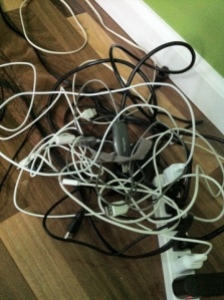Today marks four years since I started this blog. Seems like just yesterday. Thank you all who have read this blog and taken the time to comment. I know that I don’t post as often as I used to, but I’ve got a few big projects I’ve been working, and I’m going to share one of them with you very shortly. In the meantime, enjoy this post.
The Director was sitting in his office, enjoying a pumpkin spice latte. He did not like pumpkin flavor, but it was the law of the land that pumpkin flavor must be consumed in the fall.
There was a knock at the door and an intern entered.
“Sir, I’m sorry to bother you. But do you remember when we demanded that all social media websites turn over all of the personal information and preferences of their users? Well now they say they are not producing the information.”
“They’re not? I was afraid of this. All right, time for Plan B.”
“Sir, you don’t mean…”
“Oh, yes, I do. House calls.”
The media at first was skeptical of the government’s new program, whereby they sent government agents to canvass the neighbors, door to door, asking the inhabitants for their personal information. Many pundits thought it an intrusion on people’s privacy, while others thought it a patriotic duty and a chance to expose themselves to some new germs.
Analysts on both sides, however, agreed that people would not want to reveal their personal information to an agent of the government who showed up at their doorstop uninvited and in most cases without even a bottle of wine or piece of fancy cheese wrapped up in nice paper.
So they were really surprised by the responses. People provided their names and ages, of course, and their email addresses and phone numbers, and where they like to shop, and what they think about the things that other people’s kids do, versus the things that their own kids do. They asked about music tastes and food tastes and whether they were more likely to choose a table or a booth when offered both at a diner.
The program was so successful and the responses so thorough, that the government turned it into a reality tv show.
“You know, usually I go for the booth. If I’m offered both, I go for the booth.”
“So you’d classify yourself as booth in response to question 19a?”
“Well, now, sometimes I don’t feel like a booth. I gotta be honest, I like booths. But sometimes – I don’t know – I just feel like a table.”
“So would you classify yourself as a hybrid booth/table? There’s a choice for that.”
“Well, you know,” he says with his finger in his mouth, and looking up at the ceiling. “Now that I think about it a little more, I’m not sure if I ever chose a table over a booth when offered both. I think I was thinking of something that happened to my mother. Maybe I really am a booth guy after all.”
In fact, so effective was the government program that the social media websites started offering the government money for the personal data of the citizenry, in hopes of offering content that would attract more viewers. The official answer was no, but then some Congressmen and Senators got into a bit of hot water over selling of personal data to social media companies, and had to do penance by reciting the 80s pop hit single “Safety Dance” a cappella, including all of the instrumental sounds, before every session of Congress.






